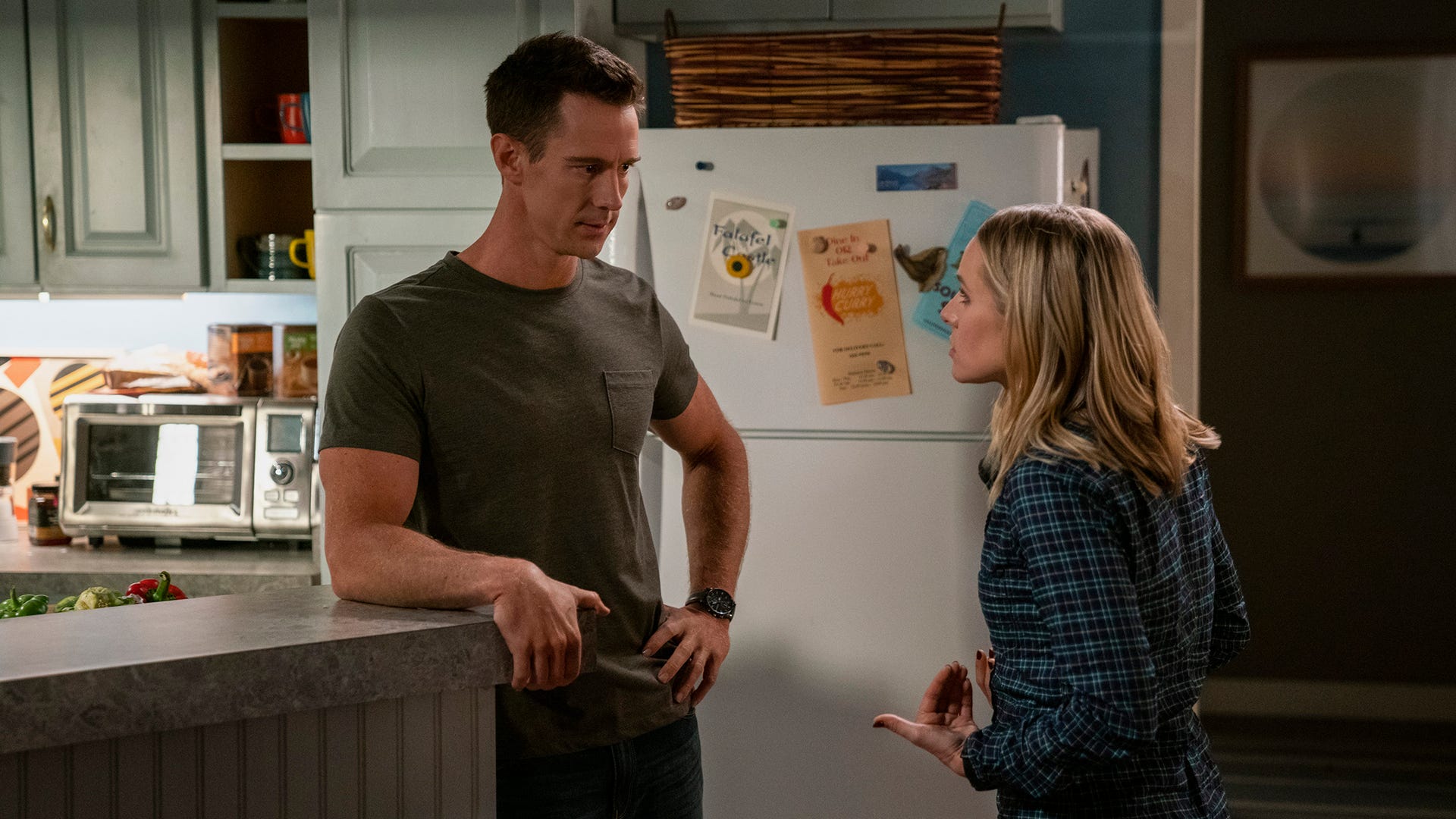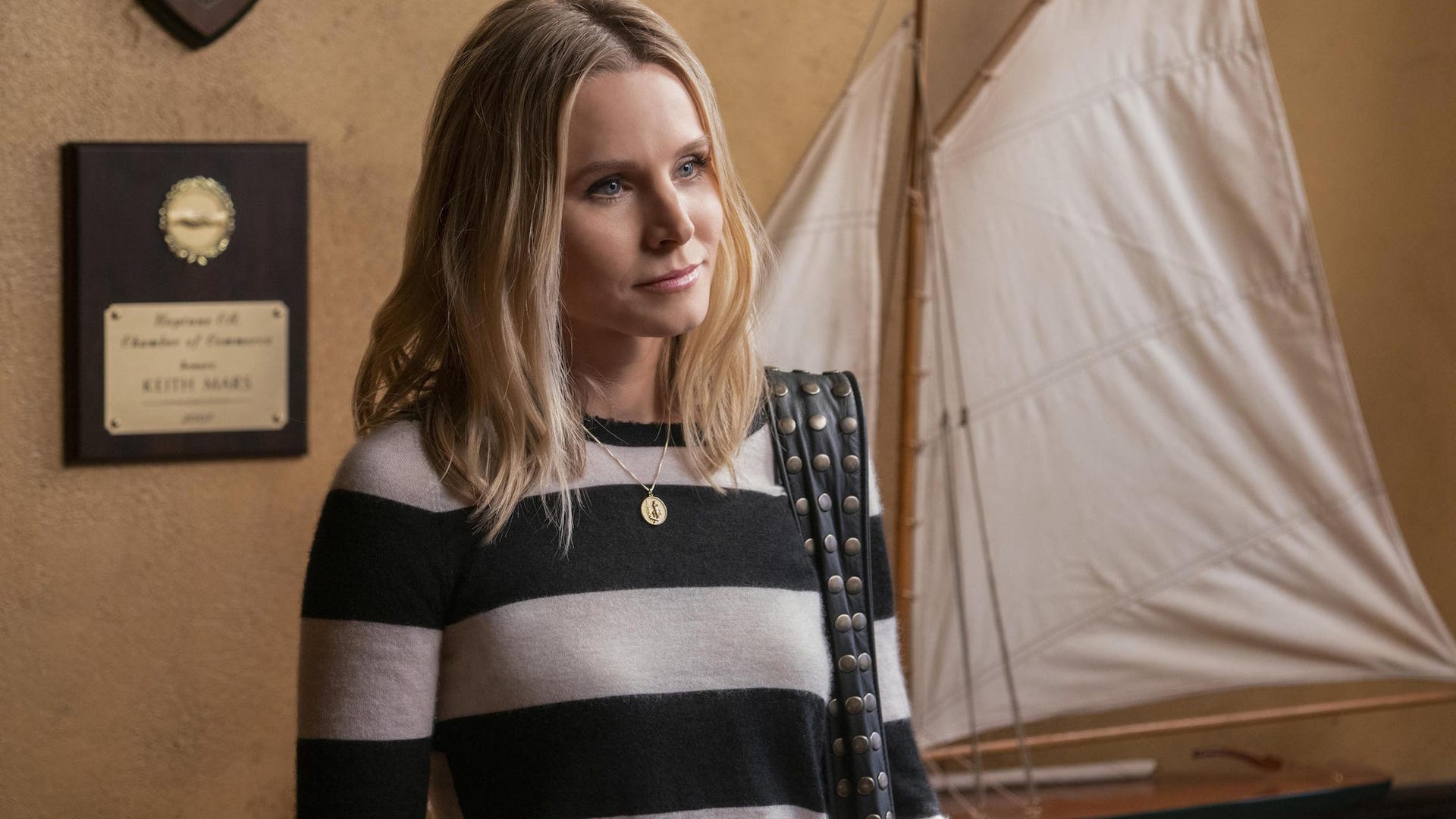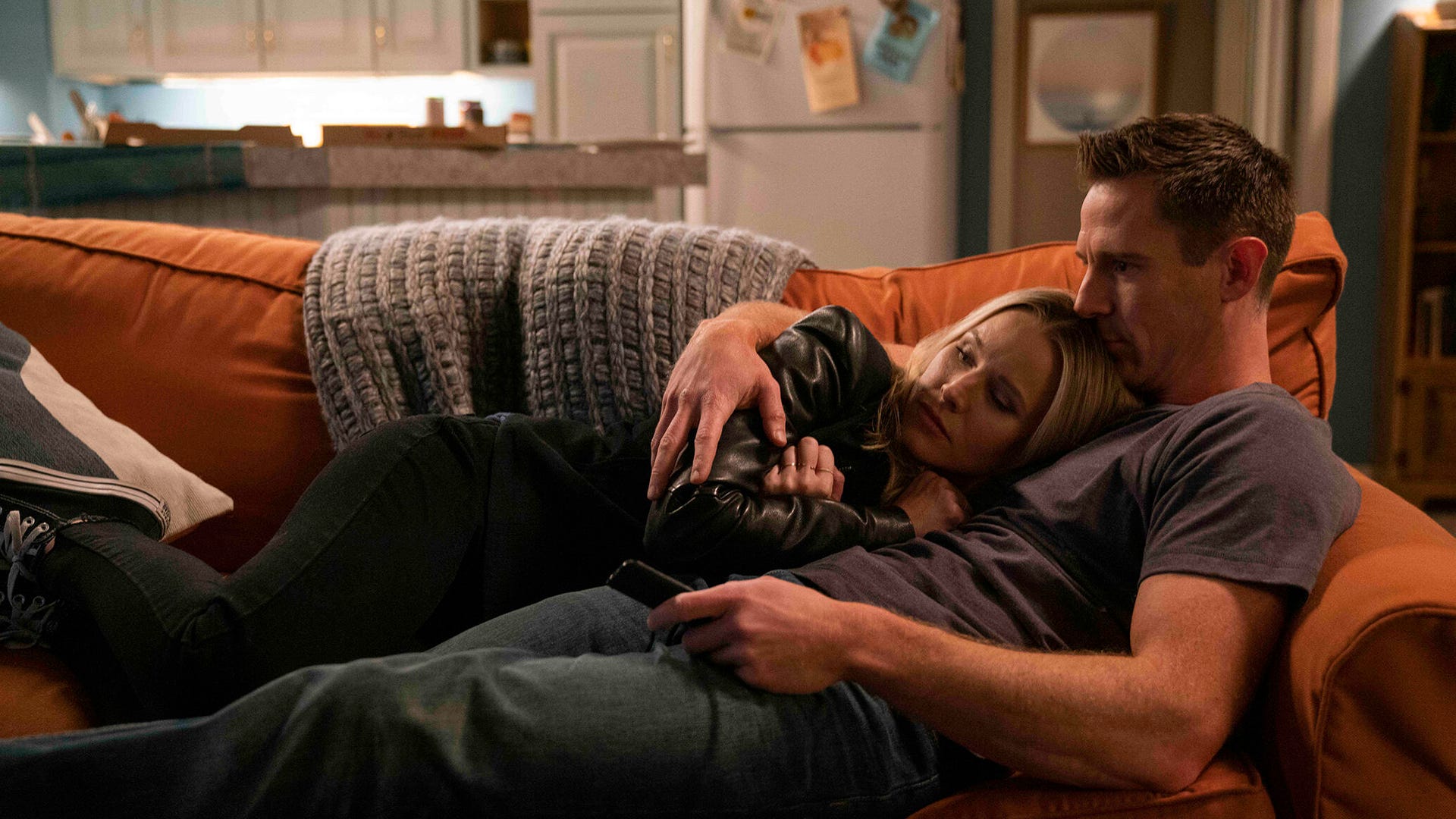Join or Sign In
Sign in to customize your TV listings
By joining TV Guide, you agree to our Terms of Use and acknowledge the data practices in our Privacy Policy.
The End of Veronica Mars Season 4 Undermined Veronica's Trauma
The revival made progress on Veronica's issues only to walk it all back
[Warning: The following contains spoilers for Veronica Mars Season 4. Read at your own risk!]
When Veronica Mars creator Rob Thomas teased that the noir drama would be more "adult" in the revival, I didn't expect him to be talking about therapy. The original series, which ran from 2004 to 2007 on UPN and The CW, introduced Veronica (Kristen Bell) as a teenage sleuth who'd already endured more trauma before her 17th birthday -- she was raped; her best friend was murdered -- than anyone should at any age. So it was satisfying to see the revival, now streaming on Hulu, take seriously the way her pain has calcified in her, leaving her angry and slow to trust, making her crave something unstable in her relationships. "Adult," in this new season, means the violence is more gruesome and the language is more colorful, but it also means maturing and reckoning with your past.
The revival is almost uniformly great, the tightest the show has been since the first season. But my favorite aspect is how willing it is to dissect its own heroine. Veronica Mars has held Veronica accountable for her mistakes in the past, but mostly from a high school perspective: Her mistakes were problems because actions have consequences. The new season is more concerned with finding the root of her flaws, unearthing what's "screwy" in her, as she puts it. The show wants to reckon with Veronica's self-destructiveness, particularly through the lens of her relationship with Logan Echolls (Jason Dohring), onetime wild-yet-sensitive bad boy turned impressively stable Naval Intelligence officer. Throughout the revival, Logan is the one encouraging Veronica to join him in therapy and pushing back against her reckless choices. But when Logan is killed in the finale by a bomb left in Veronica's car, the season winds up contradicting its own argument about how much happiness is under her control.

Jason Dohring and Kristen Bell, Veronica Mars
Michael Desmond/Hulu
Before Logan's death, the revival does its best work grappling with the messy question of where Veronica's trust issues cross the line into self-sabotage. Logan proposes to Veronica in the season premiere, which she initially turns down because nothing she's seen on the job, or from either of their families, has taught her that a marriage can last. The rejected proposal hangs over the couple for most of the season, but Veronica seems energized by that tension; she accuses Logan of proposing so he could make her "the bad guy" and blames him for not acting like the troublemaker she knew in high school, fanning the flames until he punches a cabinet. They have rough, furious sex. If the scene feels dangerously seductive in the moment, it looks worse in the light of day: Logan is hollowed out the next morning, hurt that his girlfriend is turned on by the anger he works so hard to control. "At least it was good for you," he says.
Here's How Veronica Mars Explained Mac's Absence in Season 4
Logan has his own long list of childhood traumas, less obvious in the revival than Veronica's but still familiar to fans of the original series, which is why it works for him to be the character urging her to think about what kind of life she wants for herself. He isn't trying to put a Band-Aid over an open wound; when Logan tells Veronica she doesn't have to torture herself, he speaks from experience. "You act like you don't have the power to change your circumstances," he says. "I love you. I do. But if I'm not what you want, say so. You want to stay in Neptune, you want to leave Neptune, that's also your call. It's your life, you get to do what you want." Veronica eventually has a "moment of clarity" and marries him in a sweet courthouse ceremony, but their rushed wedding isn't treated as a cure-all for her issues -- while Logan tells everyone about their engagement, right down to "the guy at the juice place who asked why I was smiling," Veronica has a hard time even telling her dad (Enrico Colantoni). The marriage moves Veronica and Logan into a stage of their relationship that could have been rich with complications if the season had ended differently.
Veronica is still in her wedding dress when Logan is killed. Every element of his senseless death feels engineered to be as devastating as possible. Thematically, the twist hammers home a common element of Veronica Mars: the chaotic, unfair brutality of the world, which hits some people over and over while seemingly leaving others, sometimes the worst people, unscathed. But it leaves an aftertaste more bitter than I think the show intended. It sends the message that Veronica is right to be so cynical; she doesn't actually have any control over the hand she's dealt in life. If the end of the revival had doubled down on hard-bitten noir cynicism, the series might have been able to sell the cruel twist, plunging Veronica further into darkness. Instead, the final minutes of Season 4 try to spin Logan's death into a vehicle for positive change: Veronica, just once, visits Logan's therapist.
The revival ends on an attempt to keep Logan's influence alive, as Veronica listens to a voicemail he left his therapist the day they got married. But the Logan in the voicemail -- the Logan whose voice Veronica carries with her as she drives out of town one year after his death -- isn't giving her the same tough love he did all season. "Is it weird to want to marry someone because you respect her, because you want to be like her? Because you want children who will inherit her qualities?" Logan asks in the recording. "I want to marry Veronica because she's the toughest human being I've ever met. Blows that would destroy most people, she always picks herself back up." After a season spent keeping her honest, Logan's legacy is to put Veronica on a pedestal.

It's a strange approach to trauma to continually heap more of it on Veronica and then celebrate how she survives. Too many TV shows use rape for easy shock value, but Veronica Mars is usually one of the good ones -- messy as it can be (the third season struggled to humanize the rape victims on Veronica's college campus as they protested for change), the show cares about trying to unpack the lingering effects of sexual assault. It isn't just aware of the way rape can harden a person but of the way sexual violence is enabled by a larger system of injustice. Veronica Mars' sharpest social commentary has always been reserved for the way the gap between the haves and the have-nots affects everything, including an abuser's ability to walk away scot-free. At one point in the new season, before her trust issues ruin the friendship, Veronica and her new friend Nicole (Kirby Howell-Baptiste) stand shoulder to shoulder, shooting bottles to work off their rage at the men who've hurt them over the years. Nothing about the show suggests that these women will ever be fully healed, and it places the blame for their trauma solely at the feet of the men who wronged them.
Is Logan Really Dead on Veronica Mars?
But Logan offers Veronica a chance at happiness, and blowing up that chance leaves the show feeling bleak in a way it never has before. The show seems not to realize, or at least refuses to face, how dark this twist really is for its heroine. Veronica Mars can't even bring itself to sit with her grief, fast-forwarding through the first year after Logan's death. This kind of denial is, really, not true to the spirit of self-reflection Logan wanted to encourage in Veronica. The finale ends by insisting that she's going to be fine, that in fact her ability to always be fine is what makes her a superhero without a cape, even though the rest of the revival did such good work bringing her down to earth and questioning how well Veronica is really handling a lifetime of anger and grief. In its last few minutes, the revival does a disservice to Logan, who grew into someone capable of challenging Veronica to be better, and it does a disservice to Veronica by forgetting what makes her such a complex character. Veronica Mars has more to offer than her toughness.
The fact that the revival is doing so many other things right helps, in some ways, to soften the blow of a frustrating, upsetting ending. But it also makes the decision to (literally) blow up the show's core romance more difficult to swallow. Veronica Mars already had a great thing going: The premise, which often sent Logan away for his job, was loose enough not to smother Veronica but tight enough to force her to face her own flaws. The show didn't need to hit a reset button to bring Veronica into the next phase of her life. Logan was already pulling her there.
Veronica Mars Season 4 is now streaming on Hulu.

Jason Dohring and Kristen Bell, Veronica Mars
Michael Desmond/Hulu